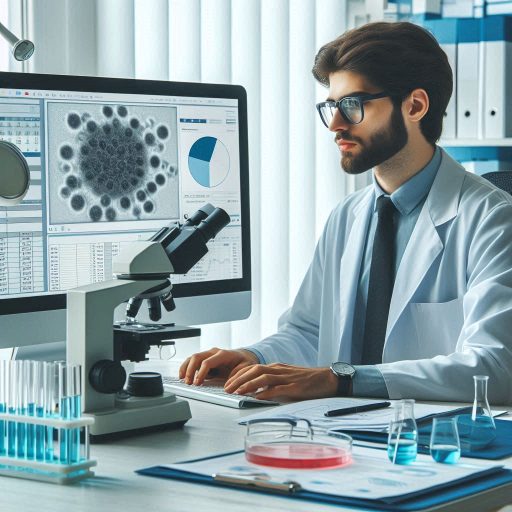Introduction
Biostatisticians play a crucial role in analyzing and interpreting data related to health and medicine.
They design studies, collect and analyze data, and interpret results to help researchers make informed decisions.
By applying statistical methods to complex biological and health-related data, biostatisticians ensure that findings are accurate, reliable, and meaningful.
Their work significantly contributes to improving public health outcomes, enhancing medical treatments, and shaping healthcare policies.
The importance of biostatisticians extends across various industries, including healthcare, pharmaceuticals, academia, and environmental science.
In the healthcare sector, they assess the effectiveness of new treatments, manage clinical trials, and evaluate patient outcomes.
Pharmaceutical companies rely heavily on biostatisticians to conduct data analysis for drug development and to prepare submissions for regulatory approvals.
Additionally, public health organizations depend on biostatisticians to track disease outbreaks, analyze epidemiological data, and inform health interventions at the community and national levels.
Given their vital contributions, biostatisticians are in high demand across many sectors.
As industries increasingly rely on data-driven decision-making, the need for skilled biostatisticians continues to grow.
This rising demand is evident in sectors such as biotechnology, where biostatisticians help develop innovative therapies and diagnostic tools.
Pharmaceutical industry
Role of Biostatisticians in Drug Development and Clinical Trials
Biostatisticians play a crucial role in drug development and clinical trials.
They design studies that evaluate new treatments for safety and efficacy.
By analyzing clinical trial data, they help determine whether a drug meets regulatory standards.
Their expertise ensures that studies follow statistical protocols and guidelines.
This role involves collaboration with researchers, clinicians, and regulatory agencies.
Biostatisticians also develop statistical models to interpret complex data sets.
They identify trends, assess risks, and help draw conclusions about treatment outcomes.
Their work is vital for moving new drugs from research phases to market approval.
Demand for Biostatisticians in Pharmaceutical Companies
The demand for biostatisticians in pharmaceutical companies is soaring.
As the industry invests in innovative therapies, the need for skilled professionals grows.
Pharmaceutical companies rely on biostatisticians to design and analyze clinical trials.
This reliance ensures that products are safe and effective for consumers.
With the rise of personalized medicine, biostatisticians are increasingly sought after for their expertise.
They contribute to developing tailored therapies based on patient characteristics and genetic profiles.
Regulatory agencies also require thorough statistical analysis, further driving demand.
The U.S. Bureau of Labor Statistics predicts significant job growth for biostatisticians in the coming years.
Skills Required for Biostatisticians in This Industry
Biostatisticians need a robust skill set to succeed in the pharmaceutical industry.
A strong foundation in statistics is essential for designing studies and analyzing data.
Proficiency in statistical software, such as SAS or R, is crucial for data analysis.
Familiarity with clinical trial protocols and regulatory requirements is also necessary.
Biostatisticians must possess excellent communication skills.
They often present complex findings to diverse audiences, including non-statisticians.
Strong problem-solving abilities are essential for tackling challenges during trials.
Attention to detail is vital for ensuring accurate data collection and analysis.
Additionally, knowledge of pharmacology and drug development processes is advantageous.
Understanding how drugs interact with biological systems helps biostatisticians assess trial outcomes.
Experience working on interdisciplinary teams is also beneficial.
Biostatisticians collaborate with various professionals, including physicians and regulatory experts.
They must be adaptable and able to thrive in fast-paced environments.
Basically, biostatisticians play a vital role in drug development and clinical trials.
Their demand in pharmaceutical companies continues to rise, reflecting the industry‘s growth.
To succeed, aspiring biostatisticians should focus on developing the necessary skills and knowledge.
A strong foundation in statistics, proficiency in software, and effective communication abilities are crucial for a successful career in this high-demand industry.
As the field evolves, biostatisticians will remain essential to advancing healthcare and improving patient outcomes.
Read: Challenges and Rewards: The Dual Life of an U.S. Environmental Scientist
Healthcare sector
Importance of Data Analysis in Improving Healthcare Outcomes
Data analysis plays a vital role in improving healthcare outcomes.
By analyzing large datasets, biostatisticians uncover trends and patterns in health-related data.
These insights can inform treatment decisions, policy-making, and public health strategies.
Effective data analysis helps identify high-risk populations and track disease outbreaks.
This proactive approach enables healthcare providers to allocate resources effectively and enhance patient care.
Accurate data interpretation ultimately leads to better health outcomes and improved quality of life for patients.
Use of Biostatistics in Medical Research and Epidemiology
Biostatistics is essential in medical research and epidemiology.
Researchers use biostatistical methods to design clinical trials and analyze their results.
Biostatisticians evaluate the effectiveness of new treatments or interventions through rigorous statistical models.
They also play a crucial role in observational studies, investigating the relationships between health outcomes and various risk factors.
In epidemiology, biostatisticians analyze data related to disease distribution and determinants.
Their work helps identify trends, evaluate interventions, and guide public health policies.
Moreover, biostatisticians often collaborate with healthcare professionals, policymakers, and researchers.
They provide statistical expertise to ensure that study designs are robust and that results are interpretable.
This collaboration enhances the reliability of research findings, which ultimately influences healthcare practices and guidelines.
By utilizing biostatistics, the medical community can make informed decisions that directly impact patient care and public health.
Job Opportunities for Biostatisticians in Hospitals, Research Institutions, and Healthcare Organizations
The demand for biostatisticians continues to grow across various sectors.
Hospitals are increasingly hiring biostatisticians to analyze patient data and improve outcomes.
They may work on projects related to treatment efficacy, patient safety, and quality improvement initiatives.
By leveraging data, biostatisticians help healthcare facilities enhance their services and patient care protocols.
Research institutions also seek skilled biostatisticians to contribute to scientific studies.
These professionals play a key role in clinical trials, helping to design studies and analyze results.
Their expertise ensures that research findings are valid and applicable to real-world scenarios.
This contribution is vital for advancing medical knowledge and developing new therapies.
Healthcare organizations, including public health agencies and non-profits, also require biostatistical expertise.
Biostatisticians in these roles analyze population health data to inform policy decisions and public health strategies.
They may evaluate the effectiveness of health programs or assess community health needs.
Their work directly influences healthcare policies and initiatives, aiming to improve health outcomes for entire populations.
Therefore, biostatisticians are in high demand due to their crucial role in data analysis within healthcare.
Their work significantly impacts medical research and public health.
Job opportunities abound in hospitals, research institutions, and healthcare organizations.
As the importance of data-driven decision-making continues to rise, biostatisticians will remain essential to improving healthcare outcomes and shaping the future of medicine.
Read: Job Market Trends: Future of Chemistry Jobs in America
Public health
Impact of Biostatistics on Public Health Policy and Decision-Making
Biostatistics significantly impacts public health policy and decision-making.
Policymakers rely on statistical analyses to understand health trends and issues.
Biostatisticians provide critical insights that shape public health initiatives.
They help identify health risks and prioritize interventions.
Their work enables evidence-based decision-making that improves community health outcomes.
For instance, biostatistical analyses can reveal correlations between environmental factors and disease prevalence.
Such information allows authorities to implement effective health policies.
By evaluating the effectiveness of public health programs, biostatisticians contribute to continuous improvement.
Their expertise is essential for developing strategies that promote healthier populations.
Role of Biostatisticians in Analyzing Population Health Data
Biostatisticians play a crucial role in analyzing population health data.
They gather and interpret data from various sources, including surveys and clinical studies.
Their analyses help identify health disparities within communities.
By examining factors such as age, race, and socioeconomic status, biostatisticians highlight areas needing attention.
They use advanced statistical techniques to analyze complex datasets.
These analyses reveal trends that can guide public health actions.
For example, biostatisticians may analyze vaccination rates to identify gaps in coverage.
Their findings can lead to targeted outreach programs that improve immunization rates.
Additionally, biostatisticians help monitor disease outbreaks by analyzing infection data.
Their timely analyses inform response strategies that protect public health.
Demand for Biostatisticians in Government Agencies, NGOs, and Public Health Organizations
The demand for biostatisticians continues to grow in various sectors.
Government agencies often seek biostatisticians to inform health policies and programs.
They analyze data from public health surveys to identify community needs.
Non-governmental organizations (NGOs) also rely on biostatisticians for research and program evaluation.
These organizations use biostatistical insights to design effective health interventions.
Public health organizations hire biostatisticians to monitor disease trends and evaluate health initiatives.
The increasing emphasis on data-driven decision-making fuels this demand.
In addition, biostatisticians are essential during health crises.
The COVID-19 pandemic underscored the need for skilled biostatisticians.
Their analyses of infection rates, hospitalizations, and vaccination coverage guided public health responses.
As the focus on global health issues rises, biostatisticians will remain in high demand.
They will be instrumental in addressing emerging health challenges and ensuring equitable access to healthcare.
Biostatistics significantly influences public health policy and decision-making.
Biostatisticians play a vital role in analyzing population health data, driving evidence-based actions.
The growing demand for biostatisticians in government agencies, NGOs, and public health organizations highlights their importance.
Their expertise will continue to shape public health initiatives and improve health outcomes.
As healthcare evolves, biostatisticians will remain essential in tackling complex health challenges.
Read: Challenges and Rewards: Navigating the Chemist Career Path

Academic research
Contribution of Biostatisticians to Academic Studies and Scientific Research
Biostatisticians play a vital role in academic studies and scientific research.
They apply statistical methods to analyze complex biological data.
Their expertise helps researchers draw meaningful conclusions from their studies.
By ensuring rigorous data analysis, biostatisticians enhance the credibility of research findings.
They work on various projects, including clinical trials, epidemiological studies, and health surveys.
In clinical trials, biostatisticians design the study and analyze the data collected.
They determine sample sizes, randomization methods, and statistical tests.
Their contributions ensure that trials meet regulatory standards and yield valid results.
In epidemiology, they help identify trends and risk factors for diseases.
This work can lead to public health interventions and improved patient outcomes.
Opportunities for Biostatisticians in Universities and Research Institutions
Biostatisticians find numerous opportunities in universities and research institutions.
Many academic programs seek biostatisticians to support faculty and student research projects.
They often serve as research collaborators, providing statistical expertise and guidance.
In addition, biostatisticians teach courses on biostatistics and data analysis methods.
Research institutions employ biostatisticians to work on large-scale studies.
These positions often involve grant writing, project management, and data interpretation.
Biostatisticians can also pursue postdoctoral fellowships, which provide further training and experience.
These roles enhance their skills while contributing to impactful research.
Collaboration Between Biostatisticians and Researchers in Various Fields
Collaboration between biostatisticians and researchers spans many fields, including medicine, public health, and environmental science.
In medical research, biostatisticians partner with clinicians to analyze patient data.
This collaboration helps improve treatment protocols and patient care strategies.
In public health, biostatisticians work with epidemiologists to assess disease outbreaks.
They analyze data to determine transmission rates and identify at-risk populations.
This information is crucial for developing effective public health responses.
Biostatisticians also collaborate with researchers in environmental science.
They help analyze data related to environmental exposures and health outcomes.
Moreover, biostatisticians contribute to projects in social sciences.
They analyze survey data to understand health behaviors and outcomes.
Their statistical skills help uncover trends that inform policy decisions.
Biostatisticians are essential to academic studies and scientific research.
They contribute significantly to the integrity and validity of research findings.
With abundant opportunities in universities and research institutions, biostatisticians can advance their careers.
Their collaboration with researchers across various fields enhances the quality of research.
As demand for biostatistical expertise grows, these professionals will continue to play a crucial role in advancing science and improving public health.
Read: Diverse Career Paths: From Chemist to Patent Attorney in the US
Biotechnology industry
Use of Biostatistics in Genetic Research, Personalized Medicine, and Biotechnology
Biostatistics plays a vital role in genetic research, personalized medicine, and biotechnology.
Researchers use biostatistical methods to analyze genetic data and understand hereditary diseases.
By applying statistical models, they can identify gene variants linked to specific conditions.
This analysis helps develop targeted therapies tailored to individual genetic profiles, enhancing treatment efficacy.
In personalized medicine, biostatisticians assess how genetic information influences drug responses.
They analyze clinical trial data to determine the effectiveness of personalized treatments.
By integrating genetic data with clinical outcomes, biostatisticians help improve patient care.
Their work ensures that medical treatments are customized based on a patient‘s genetic makeup, leading to better health outcomes.
Biotechnology relies heavily on biostatistical methods to drive innovation.
Biostatisticians evaluate experimental data from laboratory studies, ensuring the reliability of results.
They design experiments to test new biotechnological products, such as vaccines and therapies.
Statistical analysis helps identify which products are safe and effective, facilitating their advancement to clinical trials.
Demand for Biostatisticians in Biotech Companies and Research Labs
The demand for biostatisticians in biotech companies and research labs is rapidly increasing.
As the biotechnology industry grows, companies seek skilled professionals to analyze complex data sets.
Biotech firms rely on biostatisticians to support drug development, clinical trials, and regulatory submissions.
Their expertise ensures that the research is sound and results are valid.
Research labs also hire biostatisticians to assist in various projects.
They work on studies related to public health, epidemiology, and environmental science.
Biostatisticians help design studies, analyze data, and interpret findings.
Their contributions are crucial in advancing scientific knowledge and public health initiatives.
The job market for biostatisticians remains strong, with numerous opportunities available.
As the need for data-driven decisions increases, companies actively recruit biostatisticians.
This trend is particularly evident in the pharmaceutical and biotechnology sectors, where data analysis is critical for success.
Skills Needed for Biostatisticians Working in Biotechnology
To succeed in biotechnology, biostatisticians must possess a range of essential skills.
Strong statistical knowledge is fundamental.
They should be proficient in statistical software, such as R, SAS, or Python.
Familiarity with programming languages enhances their ability to manipulate data efficiently.
Additionally, biostatisticians need excellent problem-solving skills.
They must approach complex data challenges with analytical thinking.
Strong communication skills are also crucial, as they present findings to researchers and stakeholders.
Biostatisticians must explain complex statistical concepts clearly and concisely.
Understanding biological concepts is another vital skill.
Biostatisticians should have a solid grasp of genetics, molecular biology, and biotechnology principles.
This knowledge enables them to collaborate effectively with researchers and contribute meaningfully to projects.
Finally, attention to detail is paramount in biostatistics.
Biostatisticians must ensure accuracy in data analysis and reporting.
Small errors can lead to significant consequences, especially in clinical trials and drug development.
In general, biostatistics is integral to genetic research, personalized medicine, and biotechnology.
The growing demand for biostatisticians in biotech companies and research labs reflects this trend.
By developing essential skills, biostatisticians can thrive in this high-demand industry and make significant contributions to healthcare advancements.
Transform Your Career Today
Unlock a personalized career strategy that drives real results. Get tailored advice and a roadmap designed just for you.
Start NowYou Might Also Like: Day in the Life of a Research Ecologist: What to Expect
Environmental science
Application of Biostatistics in Environmental Research and Conservation Efforts
Biostatistics is essential for analyzing complex data related to environmental studies.
Researchers apply statistical methods to interpret data on biodiversity, pollution, and climate change.
Biostatisticians help design studies that assess the health of ecosystems and evaluate conservation strategies.
They analyze data to determine the effectiveness of interventions aimed at protecting endangered species and habitats.
Moreover, biostatisticians contribute to understanding the impact of human activities on natural environments.
By quantifying the effects of pollution, land use changes, and climate variability, they provide insights that inform policy decisions.
Their analyses support the development of sustainable practices and conservation programs.
This work is vital for preserving biodiversity and ensuring the health of our planet.
Job Prospects for Biostatisticians in Environmental Agencies and Consulting Firms
The demand for biostatisticians in environmental agencies and consulting firms is growing.
Government organizations increasingly rely on data-driven approaches to address environmental challenges.
Biostatisticians help these agencies evaluate data and create effective environmental policies.
Their skills are also in high demand among consulting firms that provide environmental assessments and compliance services.
In these roles, biostatisticians analyze complex datasets to offer actionable insights.
They support efforts to monitor air and water quality and assess ecological risks.
Consulting firms often seek biostatisticians to evaluate the environmental impact of various projects.
This work requires a strong understanding of both statistical methods and environmental science.
As more organizations prioritize sustainability, job prospects for biostatisticians in these fields will continue to expand.
The increasing focus on data-driven decision-making in environmental initiatives creates ample opportunities for skilled professionals.
Analyzing Data Related to Pollution, Climate Change, and Ecological Systems
Biostatisticians analyze data related to pollution, climate change, and ecological systems.
They develop models that predict the impact of pollutants on human health and ecosystems.
By analyzing trends, they identify areas at risk from climate change, helping policymakers prioritize interventions.
Their statistical expertise allows for the assessment of long-term ecological changes and the effectiveness of conservation strategies.
Biostatisticians also evaluate the relationship between human health and environmental factors.
They analyze data linking air and water quality to public health outcomes.
This work is essential for developing policies that safeguard both the environment and community health.
In summary, biostatisticians are vital in high-demand industries focused on environmental research and conservation.
Their skills in data analysis directly contribute to sustainable practices and informed policy decisions.
As environmental challenges grow, the need for biostatisticians will likely increase, offering numerous opportunities for professionals in this field.
By applying biostatistics, they help create a healthier planet for future generations.
Conclusion
Biostatisticians are in high demand across various industries that increasingly rely on data to drive decision-making.
Key sectors include pharmaceuticals, healthcare, biotechnology, and public health, all of which require skilled professionals to analyze complex datasets.
In the pharmaceutical industry, biostatisticians play a vital role in clinical trials, ensuring that new drugs are safe and effective before they reach the market.
In healthcare settings, they analyze patient data to improve treatment protocols and optimize patient care.
The biotechnology sector also benefits from biostatisticians who evaluate the efficacy of innovative therapies and assist in the development of new medical technologies.
The diverse career opportunities for biostatisticians are expansive and rewarding.
They can work in research institutions, government agencies, or private companies, contributing to various projects that influence public health.
Many biostatisticians engage in epidemiological studies, helping to identify disease patterns and risk factors in populations.
Their expertise is crucial for developing effective treatments, improving public health policies, and evaluating health programs.
Individuals interested in pursuing a career in biostatistics should explore these high-demand industries, as they offer a range of exciting and impactful roles.
Earning relevant degrees in statistics, mathematics, or biostatistics will provide a strong foundation for success.




